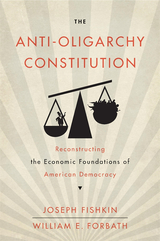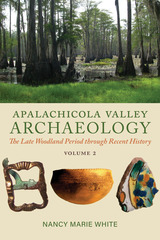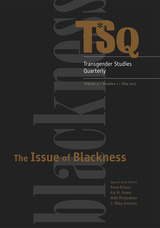
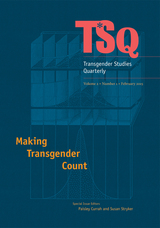
Contributors: Kellan Baker, Jenifer Bratter, Kerith J. Conron, Andrew R. Flores, Alison Gill, Nick Gorton, Jaime M. Grant, Emily A. Greytak, Jack Harrison-Quintana, Jody L. Herman, Natalie Ingraham, Jeffrey Johnson, Colton Keo-Meier, Lisa King, Anna Kłonkowska, Kyle G. Knight, Christine Labuski, Emilia Lombardi, Phoenix Alicia Matthews, Sheila J. Nezhad, Vanessa Pratt, Sari L. Reisner, Ignacio Rivera, Megan R. Rohrer, Kristen Schilt, Nfn Scout, Ben Singer, Hale Thompson
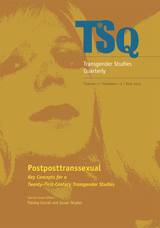

This special double issue of TSQ goes beyond the simplistic dichotomy between an exclusionary transphobic feminism and an inclusive trans-affirming feminism. Exploring the ways in which trans issues are addressed within feminist and women’s organizations and social movements around the world, contributors ask how trans, genderqueer, and nonbinary issues are related to feminist movements today, what kind of work is currently undertaken in the name of trans/feminism, what new paradigms and visions are emerging, and what questions still need to be taken up. Central to this special issue is the recognition that trans/feminist politics cannot restrict itself to the domain of gender alone.
This issue features numerous shorter works that represent the diversity of trans/feminist practices and problematics and, in addition to original research articles, includes theory, reports, manifestos, opinion pieces, reviews, and creative/artistic productions, as well as republished key documents of trans/feminist history and international scholarship.
Contributors: Miriam Abelson, Sara Ahmed, Aitzole Araneta, Alexandre Baril, Marie-Hélène/Sam Bourcier, micha cárdenas, Daniel Chávez, Jeanne Córdova, Pedro J. DiPietro, Lucía Egaña, A. Finn Enke, Karine Espineira, Sandra Fernández, Simon D. Fisher, Tania Hammidi, Christoph Hanssmann, Emma Louise Heaney, Hailey Kaas, Cael Keegan, Faris Khan, Yana Kirey-Sitnikova, Terence Kumpf, Riki Lane, Helen Hok-Sze Leung, Claudia Sofia Garriga López, Tommi Avicolli Mecca, L. Leigh Ann van der Merwe, Scott Morgensen, Marcio Jose Ornat, Ruin S. M. Pae, José Quiroga, Naomi Scheman, Joseli Maria Silva, reese simpkins, Miriam Solá, Sandy Stone, Stefania Voli, Rinaldo Walcott, Lori Watson, Cristan Williams, Shana Ye, Asli Zengin
Essays include a documentation of how readers of mass-circulation print media became aware of new medical possibilities for the surgical and hormonal alteration of sex characteristics and began agitating for them; a challenge from feminist theorists to transgender movement activists to avoid repeating the mistakes of previous feminist, gay, and lesbian political mobilizations; a critique of the overreliance on discursive analysis in much current transgender scholarship; and paired essays exploring the so-called Butch/FTM Border Wars from either side of that divide. There are also pieces that focus on intersex activism, the bioethics of gender dysphoria management, and the mobilization of transgender advocacy organizations.
Considering perceptions of queer embodiment past and present, these essays explore the sweeping changes in professional and popular attitudes regarding the transgender community and the issues that affect it. The timeliness of this issue as well as the diversity of its viewpoints makes it a significant contribution to the growing body of transgender literature.
Contributors. Cheryl Chase, Patricia Elliot, Judith Halberstam, C. Jacob Hale, Joanne Meyerowitz, James Lindeman Nelson, Katrina Roen, Henry Rubin, Susan Stryker
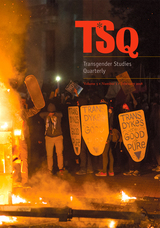
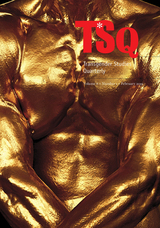

READERS
Browse our collection.
PUBLISHERS
See BiblioVault's publisher services.
STUDENT SERVICES
Files for college accessibility offices.
UChicago Accessibility Resources
home | accessibility | search | about | contact us
BiblioVault ® 2001 - 2024
The University of Chicago Press



